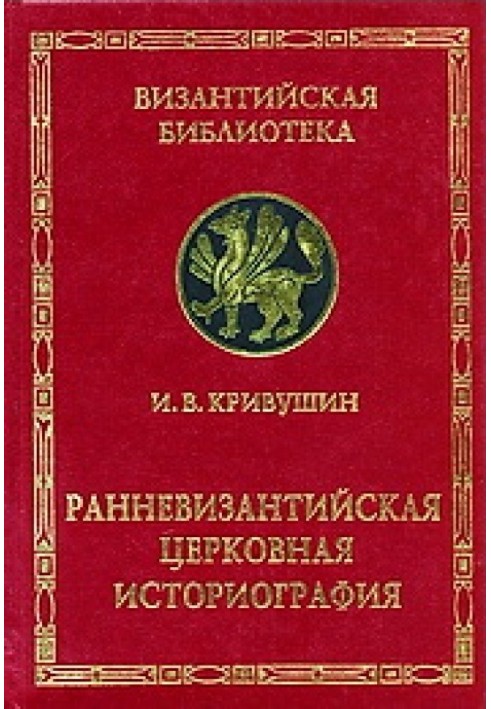Early Byzantine church historiography
 Instant download
Instant download
after payment (24/7)
 Wide range of formats
Wide range of formats
(for all gadgets)
 Full book
Full book
(including for Apple and Android)
The work is the first fundamental study in world Byzantine studies of all the orthodox early Byzantine church histories that have come down to us. I. V. Krivushin’s monograph is devoted to an extremely relevant problem for modern Byzantine studies - the problem of the conceptual evolution of early Byzantine church historiography, presented by five historians of the orthodox trend - Eusebius, Socrates , Sozomen, Theodoret and Evagrius, since the early church-historical concept has not yet become the subject of a thorough and systematic study either in Western or, especially, in domestic historiography. Moreover, this work is the first fundamental study in world Byzantine studies of all the orthodox early Byzantine church histories that have come down to us, and not only the work of the founder of the church-historical genre - Eusebius of Caesarea, who monopolized the attention of foreign scientists, while his successors were unreasonably considered by them as simple compilers. The monograph by I.V. Krivushin fills this gap - the early Byzantine followers of Eusebius appear in it as original authors who critically used the methods of interpretation and models for describing church history created by the founder of the genre. Early Byzantine church historians appear not only and not so much as providers of information about the past, but as thinkers who developed their own “philosophy of history,” different from both ancient and early Christian historical concepts. CONTENTS: INTRODUCTION 5< /p>
Section I. The Birth of the Church historiography: Eusebius of Caesarea 56
Chapter I. Prehistory of the Christian Church as interpreted by Eusebius 57Chapter II. The concept of church history by Eusebius of Caesarea 68§ 1. God and Satan in Christian history 69§ 2. The first period of the history of Christianity: from Christ to the death of John the Theologian 78§ 3. The second period of the history of Christianity; from the apostles to Diocletian. The concept of succession 80§ 4. The third period of Christian history: The Great Persecution and the Revolution of Constantine 97Chapter III. Eusebius and the early Christian church-historical concept 108§ 1. Transcendental forces in Christian history 108§ 2. Church history as succession 112§ 3. The problem of the Christian empire: the innovation of Eusebius 115
Section II. Church historical concept in church historiography of the 5th century 118Chapter I. Church-historical concept of SocratesScholasticism 120§ 1. Eventality and time in Socrates’ “History” 120§ 2. Church history as a history of unrest 132§ 3. Christian-imperial history and its interpretation by Socrates 143§ 4. Intra-church history and Christian-imperial history; autonomy and interaction 152Chapter II. Church-historical conceptErmia Sozomen 159§ 1. The triumph of Meliton’s concept. The merger of church and Christian-imperial history 161§ 2. Interpretation of the internal history of the church 169Chapter III. Church-historical concept of Theodoret of Cyrrhus 175§ 1. Intra-church history in the interpretation of Theodoret 177§ 2. Emperors and the Christian empire in the work of Theodoret. The fate of Meliton's concept 188Conclusion. Church historical concept of historians of the 5th century. General and different 197
Section I I I . Church historical thought in church historiography of the 6th century 201Chapter I. Secularization of church history in the work of Evagrius Scholastica 202§ 1. Church history in the work of Evagrius Scholastica 202§ 2. Historiographic views of Evagrius: connection with antiquity and orientation towards the secular 208§ 3. Historical concept of Evagrius 214
Conclusion 224Appendix 229Bibliography 231Resume 251
Data sheet
- Name of the Author
- Иван Кривушин Владимирович
- Language
- Russian
Reviews
Важливе дослідження для всіх, хто цікавиться візантиністикою
Книга "Ранньовізантійська церковна історіографія" є справжнім відкриттям у світі візантиністики. Автор, І. В. Кривушин, вдало заповнює прогалини в дослідженнях ранньовізантійських церковних історій, які дійшли до нас. Його робота не лише розглядає відомі праці, такі як ті, що належать Євсевію Кесарійському, але й акцентує увагу на менш відомих, але не менш значущих істориках, таких як Созомен і Феодорит. Кривушин демонструє, що ці автори не були простими компіляторами, а оригінальними мислителями, які розробляли власні концепції історії церкви. Книга містить глибокий аналіз їхніх праць, що дозволяє читачеві зрозуміти, як ранньовізантійські історики формували свою "філософію історії". Це дослідження стане незамінним джерелом для науковців, студентів та всіх, хто цікавиться історією церкви та візантійською культурою. Рекомендую всім, хто прагне глибше зрозуміти цю важливу епоху!












